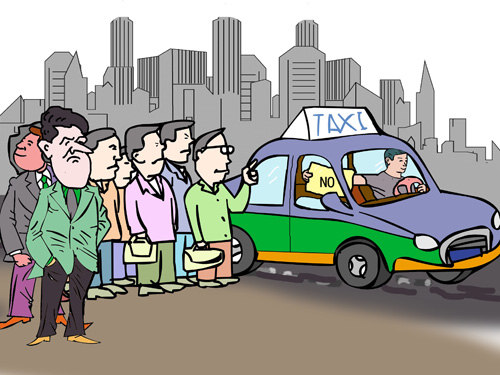|
 |
|
(LI SHIGONG) |
During rush hour, urban residents, especially those in a metropolis, all face the same problem—taking a cab. In bad weather, the problem escalates. To name but two, some taxi drivers refuse to carry passengers when the traffic is heavy or in extreme weather. Numerous complaints on the issue have sprung up recently.
Take Beijing for example, the city is currently experiencing its coldest winter in a decade, complete with snow and freezing temperatures, which adds to the problem. Most would agree that waiting for a taxi in sub-zero degree weather is a torture.
In fact, the issue has long been a heated topic for debate, prompting the necessity for effective solutions. The following are media excerpts of some ideas:
Li Zheng (People's Daily): Why is it so difficult to catch a taxi? On the whole, it's because of the lack of services. Every year, Beijing receives many new permanent and temporary residents, but overall taxi numbers remain at around 67,000. Given such a serious imbalance of supply and demand, it's almost impossible not to encounter problems.
Digging deeper, we approach the core of the question: the high threshold for taxis to enter business. Taxi services belong to a special sector where the number of cabs are determined by the amount of licenses issued by authorities. Strict control over taxi operations directly results in a severe imbalance.
It's widely agreed that peak hours are the most difficult times to catch a cab because too many people compete at this point. However, the fact is, many taxi drivers refuse to pick up passengers during rush hour. Subsequent questioning has led to in-depth problems concerning the pricing mechanism and profit distribution system.
Taxi drivers have to pay management fees to their companies. In addition, although gasoline subsidies fall far short of the rise in oil prices, taxi fees usually fail to rise in accordance. Such problems make taxi driving a tough business with little profit. Therefore, during rush hour and terrible weather, drivers naturally refuse to operate.
Since we've uncovered the root of the problem, is it possible for the government to relax its control over and expand the market? A better division of profits could further entice people to this type of occupation.
If the government lets go its grip on the taxi business, chaos might ensue due to messy competition. Thus, it's not the ideal option. However, the problem can be tackled by making profit distribution more reasonable to follow market rules.
Zhang Guohua (First Financial Daily): Taxis are one of the major transport tools in many cities. That is why the difficulty in taking taxis is such a big concern for so many people.
Low interest among taxi drivers in picking up passengers, particularly during rush hour, is to a large extent related to their poor income. In Beijing, drivers have to pay their companies 5,000 yuan to 6,000 yuan ($794-$953) before they profit themselves. With so much money turned in, enthusiasm for the work is severely undermined.
Some experts point out that taxi prices in Beijing are much lower than in other international cities. Thus, it's necessary to change current pricing standards, raising fees for every km during rush hour to stir driver interest in doing a good job.
| 